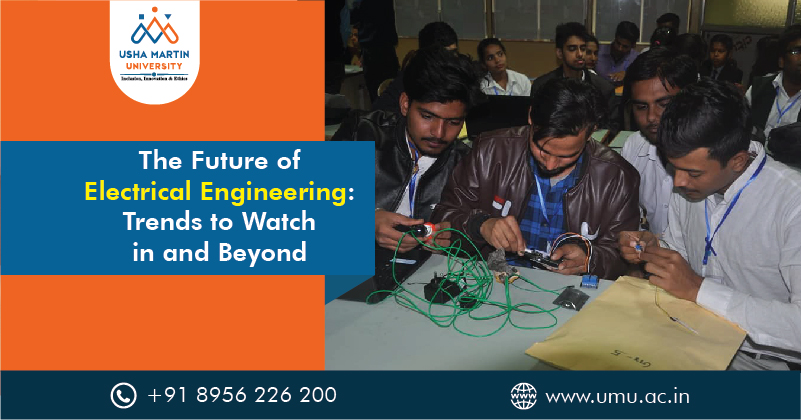
Top University in Jharkhand Opens B.Tech Admissions: Make Your Dream Come True
July 4, 2024
Success Stories: Inspiring Careers with a Diploma in Civil Engineering
July 6, 2024Electrical engineering is at the forefront of innovation. It drives advancements that shape the modern world. As we step into the future, several important trends will revolutionize the field, shaping the way we utilize electricity. From sustainable energy solutions to the integration of artificial intelligence, electrical engineering is developing rapidly. In this context, we will be able to witness some of the most promising trends within electrical engineering, both in the present and beyond. These trends not only hold the potential to transform industries but also pave the way for a more sustainable and interconnected future.
Duration: 3 Years
Eligibility: Passed Matriculation examination from any recognized board
Department of Electrical and Electronics Engineering
The Department of Electrical and Electronics Engineering at Usha Martin University, Ranchi, offers a robust curriculum that combines theoretical knowledge with practical skills. Students engage in advanced studies of electrical circuits, control systems, power electronics, and communication systems. The department is equipped with modern laboratories and experienced faculty dedicated to fostering innovation and research. Graduates are well-prepared for diverse career opportunities in industries such as energy, telecommunications, and automation.
Top 6 Trends to Watch in Electrical Engineering:
-
Renewable Energy Integration
As the world transitions towards cleaner energy sources, electrical engineers will play an important role in integrating renewable energy technologies such as solar, wind, and hydroelectric power into existing electrical grids. This involves developing smart grid technologies, energy storage solutions, and efficient power conversion systems. Their expertise is essential for realizing a sustainable and resilient energy future.
-
Electric Vehicles (EVs) and Infrastructure
The widespread adoption of electric vehicles necessitates advancements in battery technology, charging infrastructure, and power management systems. Electrical engineers are working on improving battery efficiency, developing fast-charging solutions, and optimizing the integration of EVs with the grid. Electrical engineers play a multifaceted role in advancing electric vehicles and their infrastructure, driving innovation towards a cleaner, more sustainable future for transportation.
-
Internet of Things (IoT) and connectivity
The proliferation of IoT devices requires electrical engineers to design low-power, high-performance sensors, wireless communication protocols, and networking infrastructure. Their multidisciplinary skills make them indispensable in the rapidly evolving field of IoT technology, which has applications in various sectors, including healthcare, agriculture, manufacturing, and smart cities.
-
Artificial Intelligence (AI) and Machine Learning
AI and machine learning techniques are being increasingly applied in electrical engineering for tasks such as optimization, predictive maintenance, and autonomous control. Electrical engineers are using AI algorithms to enhance the efficiency, reliability, and performance of electrical systems. They bring a deep understanding of hardware, signal processing, control systems, and communication technologies to the field of AI and ML, enabling the development of innovative and high-performance intelligent systems.
-
Smart Grids and Energy Storage
Smart grid technology enables better management of electricity generation, transmission, and distribution. Electrical engineers play a crucial role in advancing the capabilities of smart grids and energy storage systems, driving the transition towards a more sustainable and resilient energy infrastructure.
-
Environmental and Sustainable Solutions
Beyond renewable energy, electrical engineers are exploring ways to minimize the environmental impact of technology. This includes designing energy-efficient systems, reducing electronic waste, and developing eco-friendly manufacturing processes.
Diploma (EEE) Engineering Admission Open 2025:
Electrical engineering courses are quite popular among students. Students pursue the course either at the diploma or degree level. At Usha Martin University, one of the leading universities in Jharkhand, we believe in nurturing talent and shaping future leaders in engineering. Join us and become a part of our vibrant academic community! Currently, admissions have opened for the Diploma in EEE Engineering program at Usha Martin University for 2025.
The course can be pursued after the 10th and will last for 3 years. The course is conducted semester-wise. After each semester exam is conducted, the students need to clear all the semesters in order to be awarded the diploma. The curriculum covers a variety of subjects like electrical machines, basic electronics, digital signal processing, elements of electrical engineering, embedded systems, transmission and distribution, and electrical installation.
The course is highly application-oriented, focusing primarily on practical concepts and real-world scenarios. The purpose of the electrical diploma course is to equip students with practical skills and theoretical understanding that are essential for working in roles in the field of electrical engineering.
The university has its own career counseling and placement cell, which provides students with 100% placement support. The placement record has been quite satisfactory due to the sincere effort and hard work of students, faculty, and the placement cell. Top-rated companies hired the previous year’s diploma students during the placement drive organized on campus. Students have a wide range of career opportunities after they pursue the course.
A diploma in electrical engineering offers job roles such as electrical engineer, electronics engineer, automation engineer, renewable energy engineer, control systems engineer, instrumentation engineer, embedded systems engineer, and power systems engineer.
Conclusion:
In summary, the future of electrical engineering is characterized by innovation, sustainability, and interconnectedness. To drive progress in this dynamic field, engineers will need to adapt to emerging technologies, collaborate across disciplines, and address complex societal challenges.





